高考短文改错[下学期]
图片预览
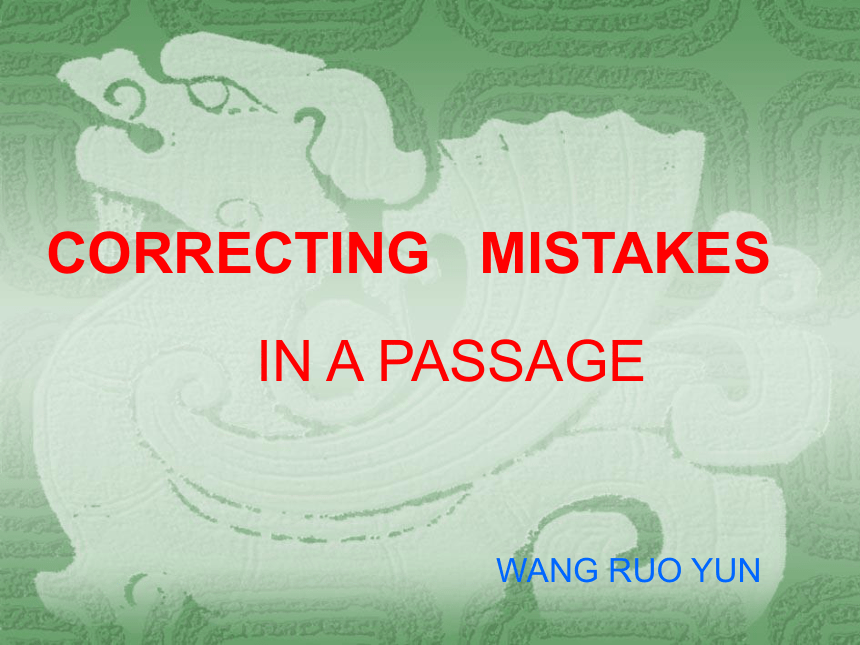
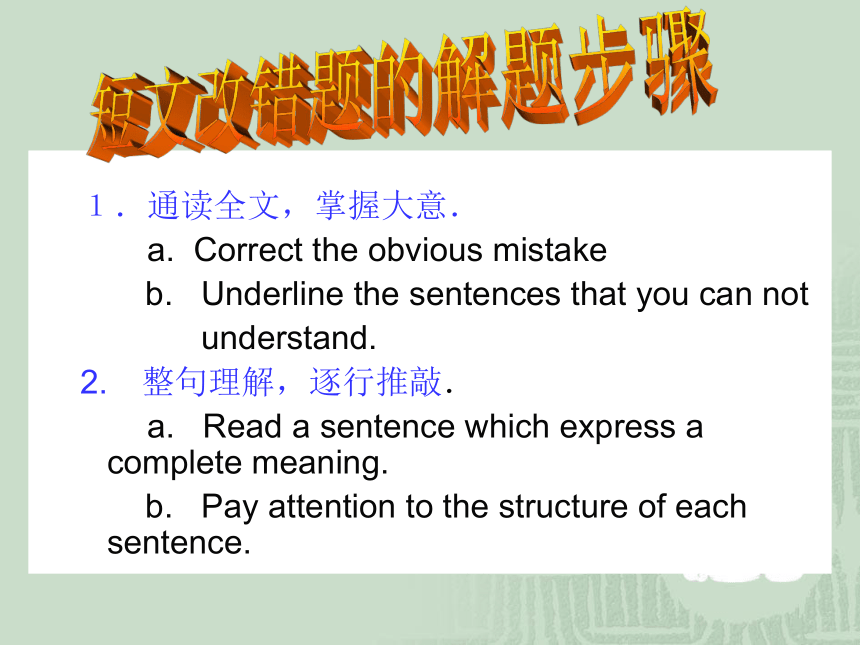
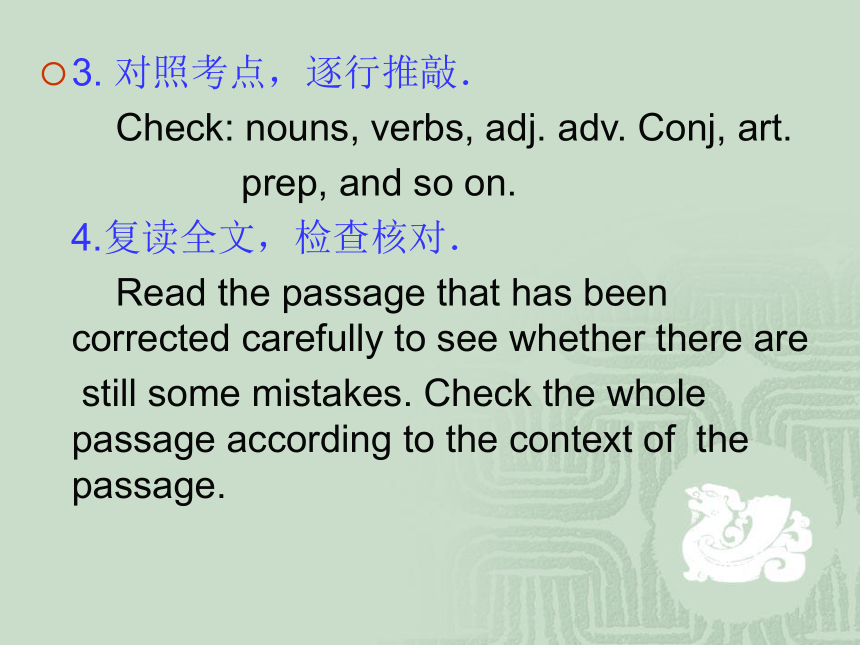

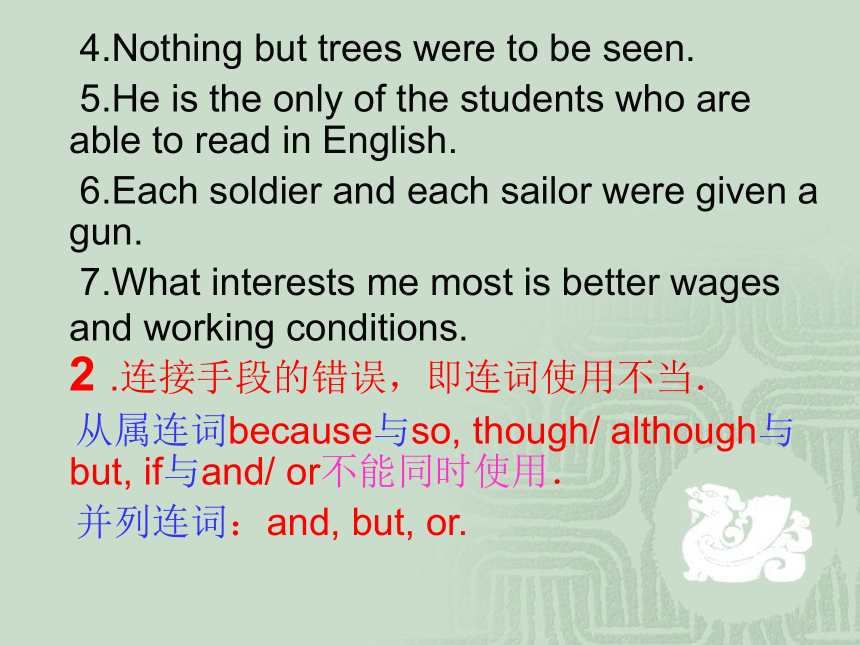
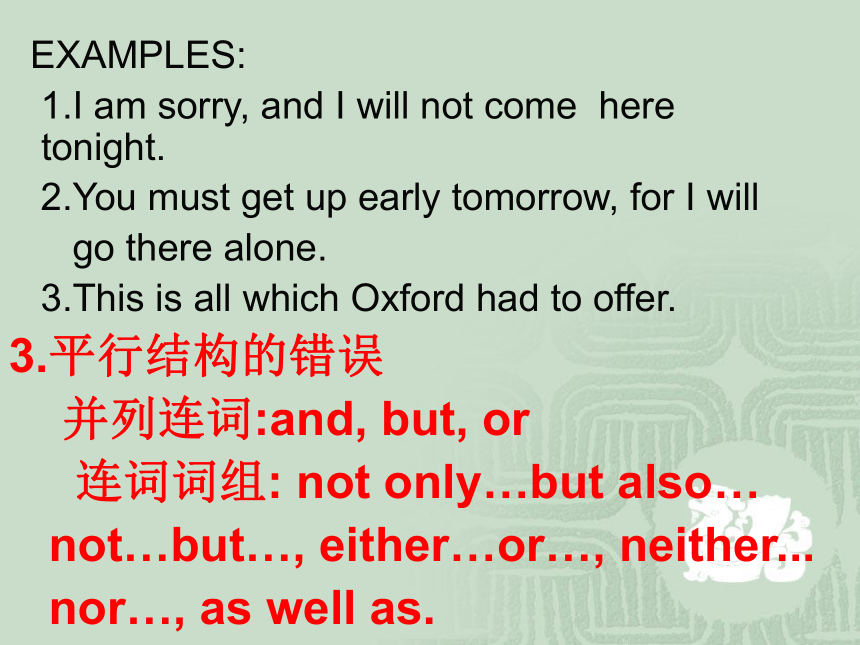
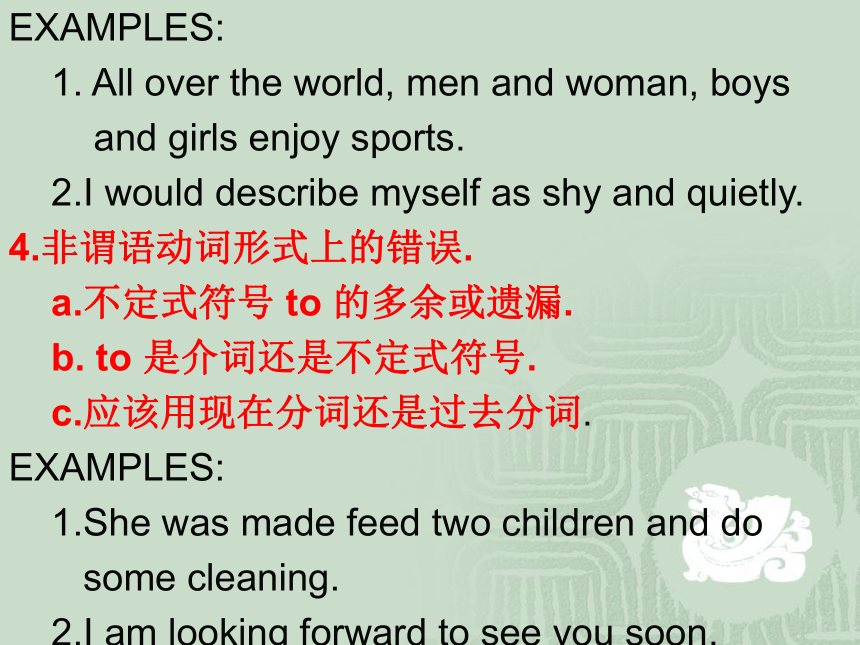
文档简介
课件14张PPT。CORRECTING MISTAKES WANG RUO YUNIN A PASSAGE
1.通读全文,掌握大意.
a. Correct the obvious mistake
b. Underline the sentences that you can not
understand.
2. 整句理解,逐行推敲.
a. Read a sentence which express a complete meaning.
b. Pay attention to the structure of each sentence.
短文改错题的解题步骤3. 对照考点,逐行推敲.
Check: nouns, verbs, adj. adv. Conj, art.
prep, and so on.
4.复读全文,检查核对.
Read the passage that has been corrected carefully to see whether there are
still some mistakes. Check the whole passage according to the context of the passage.短文改错题的命题角度1.一致关系的错误.
主谓,时态,代词,动词时态和时间状语或上下文时态一致.
1.Not only you but also he are interested in the talk.
2.Is not only you but also he interested in the talk?
3.Half of the apples is bad. 4.Nothing but trees were to be seen.
5.He is the only of the students who are able to read in English.
6.Each soldier and each sailor were given a gun.
7.What interests me most is better wages and working conditions. 2 .连接手段的错误,即连词使用不当.
从属连词because与so, though/ although与but, if与and/ or不能同时使用.
并列连词:and, but, or.
EXAMPLES:
1.I am sorry, and I will not come here tonight.
2.You must get up early tomorrow, for I will
go there alone.
3.This is all which Oxford had to offer.
3.平行结构的错误
并列连词:and, but, or
连词词组: not only…but also…
not…but…, either…or…, neither...
nor…, as well as.EXAMPLES:
1. All over the world, men and woman, boys
and girls enjoy sports.
2.I would describe myself as shy and quietly.
4.非谓语动词形式上的错误.
a.不定式符号 to 的多余或遗漏.
b. to 是介词还是不定式符号.
c.应该用现在分词还是过去分词.
EXAMPLES:
1.She was made feed two children and do
some cleaning.
2.I am looking forward to see you soon. 3.My grandfather has been used to live quietly
in the country.
4.The room is dirty, it needs cleaned.
5.I heard her singing there last night.
6.Losing in thought, he almost ran into the car
in front of him.
7.The teacher came in, followed a group of
students.
8.Seated himself in a chair, M r smith began
to look though the evening paper.
9.Her father escaped killed in the war.
5.词汇多余.
a.关系代词或关系副词所代替的词是否重副出现.
b.程度副词或频率副词,如much, more, often 等
是否多余.
EXAMPLES:
1.This is the book I bought it yesterday.
2.Even though he is the most fastest runner,
he is not a good athlete because he lacks
courage.
3.The boy is very cleverer than the girl.
6.冠词使用不当.
a.不可数名词前多冠词.
b.单数可数名词前少冠词.
c. a与the错用.
d.固定搭配中的冠词错用.
EXAMPLES:
1.Tom told the doctor he had got headache
and bad cough.
2.What a good news we have heard.
3.The policeman caught me by my arm.
4.He found a job paid by an hour.
5.The sun gives us light during day.
6.It is a great fun to collect coins. 7.China has changed so greatly since eighties
of the twentieth century.
8.Many people dream of working in the space
like astronauts.
7.名词的数与格的错误.
EXAMPLES:
1.Her new novel is great success.
2.I forgot all of the room’s numbers.
3.Look ! Two Germen are coming this way.
4.Put on more clothing, or you will catch a cold.
5.It is not my book. Maybe it is somebody else.
6.In our school, there are eighty woman teachers in
all. 7.The Smith, will make a trip to china during the
coming spring.
8.The patient has stayed in the hospital for one
and a half month.
9.I asked the salesman for some changes. But
he had only a large one.
8.词汇固定搭配的错误.
9.词性分辨错误.
由词在句中的位置及与其它词所形成的修饰与
被修饰关系决定.
10.行文逻辑上的错误.
此为最难改的错误,须细读全文,掌握全文逻辑
发展顺序. PRACTICE
(2005全国卷Ⅰ Ⅱ)
There are advantage for students to work while
___
studying at school. One of them was that ___
they can earn money. For the most part, ___
students working to earn money for their own ___
use .Earning their own money allow them ___
to spend on anything as if they please. ___
They would have to ask their parents for ___
money or for permission to do things by ___
the money. Some students may also to save ___
up for our college or future use. ___
End
1.通读全文,掌握大意.
a. Correct the obvious mistake
b. Underline the sentences that you can not
understand.
2. 整句理解,逐行推敲.
a. Read a sentence which express a complete meaning.
b. Pay attention to the structure of each sentence.
短文改错题的解题步骤3. 对照考点,逐行推敲.
Check: nouns, verbs, adj. adv. Conj, art.
prep, and so on.
4.复读全文,检查核对.
Read the passage that has been corrected carefully to see whether there are
still some mistakes. Check the whole passage according to the context of the passage.短文改错题的命题角度1.一致关系的错误.
主谓,时态,代词,动词时态和时间状语或上下文时态一致.
1.Not only you but also he are interested in the talk.
2.Is not only you but also he interested in the talk?
3.Half of the apples is bad. 4.Nothing but trees were to be seen.
5.He is the only of the students who are able to read in English.
6.Each soldier and each sailor were given a gun.
7.What interests me most is better wages and working conditions. 2 .连接手段的错误,即连词使用不当.
从属连词because与so, though/ although与but, if与and/ or不能同时使用.
并列连词:and, but, or.
EXAMPLES:
1.I am sorry, and I will not come here tonight.
2.You must get up early tomorrow, for I will
go there alone.
3.This is all which Oxford had to offer.
3.平行结构的错误
并列连词:and, but, or
连词词组: not only…but also…
not…but…, either…or…, neither...
nor…, as well as.EXAMPLES:
1. All over the world, men and woman, boys
and girls enjoy sports.
2.I would describe myself as shy and quietly.
4.非谓语动词形式上的错误.
a.不定式符号 to 的多余或遗漏.
b. to 是介词还是不定式符号.
c.应该用现在分词还是过去分词.
EXAMPLES:
1.She was made feed two children and do
some cleaning.
2.I am looking forward to see you soon. 3.My grandfather has been used to live quietly
in the country.
4.The room is dirty, it needs cleaned.
5.I heard her singing there last night.
6.Losing in thought, he almost ran into the car
in front of him.
7.The teacher came in, followed a group of
students.
8.Seated himself in a chair, M r smith began
to look though the evening paper.
9.Her father escaped killed in the war.
5.词汇多余.
a.关系代词或关系副词所代替的词是否重副出现.
b.程度副词或频率副词,如much, more, often 等
是否多余.
EXAMPLES:
1.This is the book I bought it yesterday.
2.Even though he is the most fastest runner,
he is not a good athlete because he lacks
courage.
3.The boy is very cleverer than the girl.
6.冠词使用不当.
a.不可数名词前多冠词.
b.单数可数名词前少冠词.
c. a与the错用.
d.固定搭配中的冠词错用.
EXAMPLES:
1.Tom told the doctor he had got headache
and bad cough.
2.What a good news we have heard.
3.The policeman caught me by my arm.
4.He found a job paid by an hour.
5.The sun gives us light during day.
6.It is a great fun to collect coins. 7.China has changed so greatly since eighties
of the twentieth century.
8.Many people dream of working in the space
like astronauts.
7.名词的数与格的错误.
EXAMPLES:
1.Her new novel is great success.
2.I forgot all of the room’s numbers.
3.Look ! Two Germen are coming this way.
4.Put on more clothing, or you will catch a cold.
5.It is not my book. Maybe it is somebody else.
6.In our school, there are eighty woman teachers in
all. 7.The Smith, will make a trip to china during the
coming spring.
8.The patient has stayed in the hospital for one
and a half month.
9.I asked the salesman for some changes. But
he had only a large one.
8.词汇固定搭配的错误.
9.词性分辨错误.
由词在句中的位置及与其它词所形成的修饰与
被修饰关系决定.
10.行文逻辑上的错误.
此为最难改的错误,须细读全文,掌握全文逻辑
发展顺序. PRACTICE
(2005全国卷Ⅰ Ⅱ)
There are advantage for students to work while
___
studying at school. One of them was that ___
they can earn money. For the most part, ___
students working to earn money for their own ___
use .Earning their own money allow them ___
to spend on anything as if they please. ___
They would have to ask their parents for ___
money or for permission to do things by ___
the money. Some students may also to save ___
up for our college or future use. ___
End
